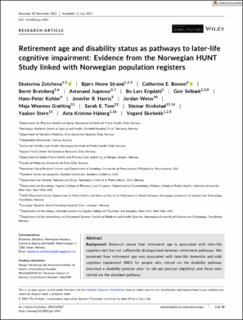| dc.contributor.author | Zotcheva, Ekaterina | |
| dc.contributor.author | Strand, Bjørn Heine | |
| dc.contributor.author | Bowen, Catherine E | |
| dc.contributor.author | Bratsberg, Bernt Magne | |
| dc.contributor.author | Jugessur, Astanand | |
| dc.contributor.author | Engdahl, Bo Lars | |
| dc.contributor.author | Selbæk, Geir | |
| dc.contributor.author | Kohler, Hans-Peter | |
| dc.contributor.author | Harris, Jennifer Ruth | |
| dc.contributor.author | Weiss, Jordan | |
| dc.contributor.author | Grøtting, Maja Weemes | |
| dc.contributor.author | Tom, Sarah E. | |
| dc.contributor.author | Krokstad, Steinar | |
| dc.contributor.author | Stern, Yaakov | |
| dc.contributor.author | Håberg, Asta | |
| dc.contributor.author | Skirbekk, Vegard Fykse | |
| dc.date.accessioned | 2023-09-05T09:08:58Z | |
| dc.date.available | 2023-09-05T09:08:58Z | |
| dc.date.created | 2023-07-25T08:42:31Z | |
| dc.date.issued | 2023 | |
| dc.identifier.citation | International Journal of Geriatric Psychiatry. 2023, 38 (7), 1-10. | en_US |
| dc.identifier.issn | 0885-6230 | |
| dc.identifier.uri | https://hdl.handle.net/11250/3087426 | |
| dc.description.abstract | Background
Research shows that retirement age is associated with later-life cognition but has not sufficiently distinguished between retirement pathways. We examined how retirement age was associated with later-life dementia and mild cognitive impairment (MCI) for people who retired via the disability pathway (received a disability pension prior to old-age pension eligibility) and those who retired via the standard pathway.
Methods
The study sample comprised 7210 participants from the Norwegian Trøndelag Health Study (HUNT4 70+, 2017–2019) who had worked for at least one year in 1967–2019, worked until age 55+, and retired before HUNT4. Dementia and MCI were clinically assessed in HUNT4 70+ when participants were aged 69–85 years. Historical data on participants' retirement age and pathway were retrieved from population registers. We used multinomial regression to assess the dementia/MCI risk for women and men retiring via the disability pathway, or early (<67 years), on-time (age 67, old-age pension eligibility) or late (age 68+) via the standard pathway.
Results
In our study sample, 9.5% had dementia, 35.3% had MCI, and 28.1% retired via the disability pathway. The disability retirement group had an elevated risk of dementia compared to the on-time standard retirement group (relative risk ratio [RRR]: 1.64, 95% CI 1.14–2.37 for women, 1.70, 95% CI 1.17–2.48 for men). MCI risk was lower among men who retired late versus on-time (RRR, 0.76, 95% CI 0.61–0.95).
Conclusion
Disability retirees should be monitored more closely, and preventive policies should be considered to minimize the dementia risk observed among this group of retirees. | en_US |
| dc.language.iso | eng | en_US |
| dc.publisher | Wiley | en_US |
| dc.rights | Navngivelse 4.0 Internasjonal | * |
| dc.rights.uri | http://creativecommons.org/licenses/by/4.0/deed.no | * |
| dc.title | Retirement age and disability status as pathways to later-life cognitive impairment: Evidence from the Norwegian HUNT Study linked with Norwegian population registers | en_US |
| dc.title.alternative | Retirement age and disability status as pathways to later-life cognitive impairment: Evidence from the Norwegian HUNT Study linked with Norwegian population registers | en_US |
| dc.type | Peer reviewed | en_US |
| dc.type | Journal article | en_US |
| dc.description.version | publishedVersion | en_US |
| dc.source.pagenumber | 1-10 | en_US |
| dc.source.volume | 38 | en_US |
| dc.source.journal | International Journal of Geriatric Psychiatry | en_US |
| dc.source.issue | 7 | en_US |
| dc.identifier.doi | 10.1002/gps.5967 | |
| dc.identifier.cristin | 2163386 | |
| dc.relation.project | National Institutes of Health: R01AG069109-01 | en_US |
| cristin.ispublished | true | |
| cristin.fulltext | original | |
| cristin.qualitycode | 1 | |

